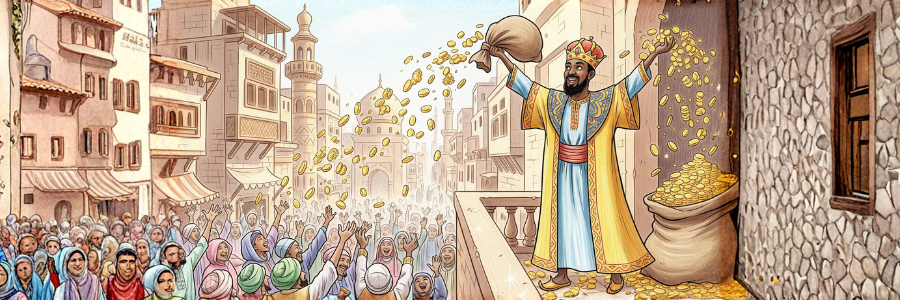
Posted October 13, 2025
By Sean Ring
Send in the Golden Meteor!
The Paradigm Shift 2025 Conference was a success by every measure. I’m delighted that I got to meet so many wonderful subscribers. And thanks to the Tigers-Mariners 15-inning marathon Friday night into Saturday morning, I got to hang out with some special people for even longer than I thought possible!
As I’m now back in Italy, liver wrung out and decent coffee imbibed, there’s one moment in the conference I want to tell you about.
You may already know we do a “Whisky Bar” at all our events. I was thrilled to share the stage with Paradigm’s usual suspects: Doug Hill of RETA fame, Strategic Intelligence’s Byron King, Life Income Report’s Zach Scheidt, Mr. 10X Chris Cimorelli, and The Maverick Enrique Abeyta. Along with the inimitable James Altucher and The Man Himself, Jim Rickards, JC Parets of TrendLabs and All Star Charts fame joined us, as well. If you’re not familiar with JC, he’s the best technical analyst/chartist in the world, for my money, and is often seen on CNBC and Bloomberg. I’ve followed his excellent work for years.
At one point, MC Doug Hill challenged us, “What’s the biggest risk to the markets right now?”
Enrique said, “The assassination of the president.”
Byron said, “A gold meteor hitting the earth.”
JC chimed in immediately, saying he was glad things were going so well, we were worried about things like assassinations and meteors. The crowd roared with laughter. It was a genuinely funny comment and a welcome moment of levity in the serious business of making money.
Never one to step on the laughter, I joined in, but was quietly thinking, “Is no one else thinking of Mansa Musa?”
What Are The Odds?
First, I owe it to you to make the mathematics clear.
The probability of a meteor hitting the Earth this year is 0.00000333% (1 in 300,000).
The probability of a meteor hitting the Earth and being made of gold is so infinitesimally small, it may as well be zero, even in our lifetimes.
Will Mother Earth poop out a giant golden egg that’ll expand the supply of gold so much that gold will lose all its value because of this new abundance?
Unlikely.
I don’t want you to waste one microsecond worrying about this. There are reasons far closer to home to stock up on canned goods.
In short, the laughter was warranted.
However, a “golden meteor” did hit Earth in the 14th century. Except it wasn’t really a meteor. It was a man. An exorbitantly rich man. And that man inadvertently wrecked the Middle East’s economy for over a decade.
Let me tell you about Mansa Musa.
Mansa Who-sa?
By every historical measure, Mansa Musa, emperor of Mali, was the wealthiest man who ever lived. His empire sat on some of the largest gold deposits on Earth.
But unlike the fictional Edmond Dantes, who used the treasure of Monte Cristo to exact revenge on his enemies, Mansa Musa decided to share his gold with the people in history’s most lavish exhibition of noblesse oblige.
On his famous Hajj to Mecca, he decided to donate some of his riches, traveling with tens of thousands of attendants, soldiers, slaves, and camels loaded with gold dust and ingots.
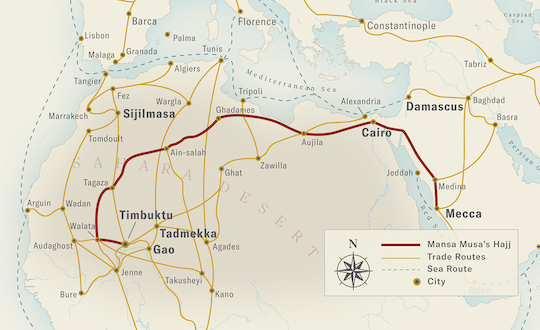 Credit: African History Extra
Credit: African History Extra
Alas, he gave away so much of the stuff that he crashed an entire regional economy.
Yes, you read that right. Mansa Musa’s generosity triggered one of the earliest and most vivid demonstrations of Gresham’s Law—and centuries before Sir Thomas Gresham was even born.
When Good Money Drives Out… Everything Else
When Mansa Musa reached Cairo, his display of wealth stunned the Muslim world. He handed out gold to everyone, from street beggars to the Sultan himself. But by flooding the city with gold, he devalued it overnight. Prices rose. Merchants raised rates. The purchasing power of money collapsed.
The chroniclers of the time wrote that the inflationary shock lasted more than a decade. Definitely not transitory, then. Gold had become—ironically—too common. It was no longer “good money.” And the best proof of that came when Musa returned to Cairo years later, trying to buy back his own gold at a loss to stabilize the market. Imagine Jay Powell flying back to Wall Street to mop up the liquidity he himself dumped the week before.
This was Gresham’s Law before it was coined: “Bad money drives out good.” Except here, the “bad” wasn’t counterfeit or debased coinage—it was abundance itself.
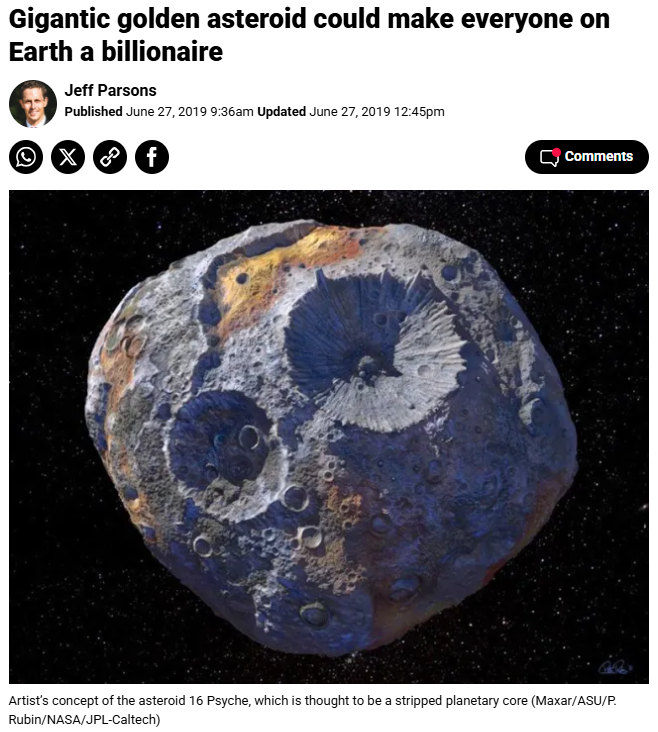 Utterly moronic. Credit: Metro
Utterly moronic. Credit: Metro
Musa’s tsunami of gold made money less valuable, not more. Too much of a good thing really can kill you—especially when it comes to currency.
A Medieval Liquidity Crisis
The episode reads like a 14th-century version of quantitative easing gone mad. Musa didn’t just distribute wealth; he distorted markets.
Cairo’s monetary system was based almost entirely on the gold dinar. When Musa dumped tons of physical gold into circulation, the ratio between gold and goods collapsed. A loaf of bread might cost two dinars one month, four the next. Sound familiar?
Inflation isn’t a modern invention—it just didn’t have a central bank press release back then.
And the parallels go deeper. Niall Ferguson, in his phenomenal book, The Ascent of Money, once pointed out that when Spain flooded Europe with silver from the New World, it suffered the same fate as Cairo: too much money chasing too few goods.
Spain went bankrupt—six times between 1557 and 1653—because its rulers thought controlling the world’s bullion meant controlling the world’s wealth.
They confused money with value, just like Musa did.
From Mali to Madrid to Washington
The Mali Empire’s temporary gold glut and Spain’s serial defaults share the same root cause: the seductive illusion that liquidity equals prosperity.
But as both stories show, when a society confuses its means of exchange for means of production, collapse isn’t far behind. The flood of money—whether gold dust in Cairo or printed dollars in D.C.—always leads to the same sequence:
- Exuberance. “We’re richer than ever!”
- Inflation. “Wait, why is everything more expensive?”
- Distortion. “Why are merchants hoarding goods?”
- Correction. “Whoops… we broke the system.”
Musa’s legend survives because he was the first to prove that wealth without restraint is indistinguishable from destruction.
The Real Legacy
To his credit, Musa eventually did something wiser with his fortune: he built institutions—Timbuktu’s mosques, universities, and libraries—that outlasted the gold itself. In other words, he converted hard assets into cultural capital.
That’s what separates him from Spain, which squandered its silver empire on war and interest payments. As Ferguson quipped, “The gold and silver from the New World made Spain rich for a century and poor for four.”
And here we are again. Central banks have done their own 21st-century version of the “Mansa Musa Money Dump.” Trillions printed, zero restraint, zero understanding of the side effects.
They think they can conjure wealth out of paper. At least Mansa Musa had the decency to use gold.
Wrap Up
The lesson of Mansa Musa and Spain is timeless—money supply is not wealth. When you mistake the medium for the miracle, you’re already sowing the seeds of collapse.
Mansa Musa wanted to show the world Africa’s greatness. He did. But he also taught us an enduring truth: even gold can become “bad money” if you flood the system with too much of it.
Will gold become too abundant? Doubt it. Will we have a gold collapse? Highly unlikely.
With all that said, it did happen. Once, in the distant past, in a land far, far away.
But it takes a King to remind us, and thankfully, Byron did.
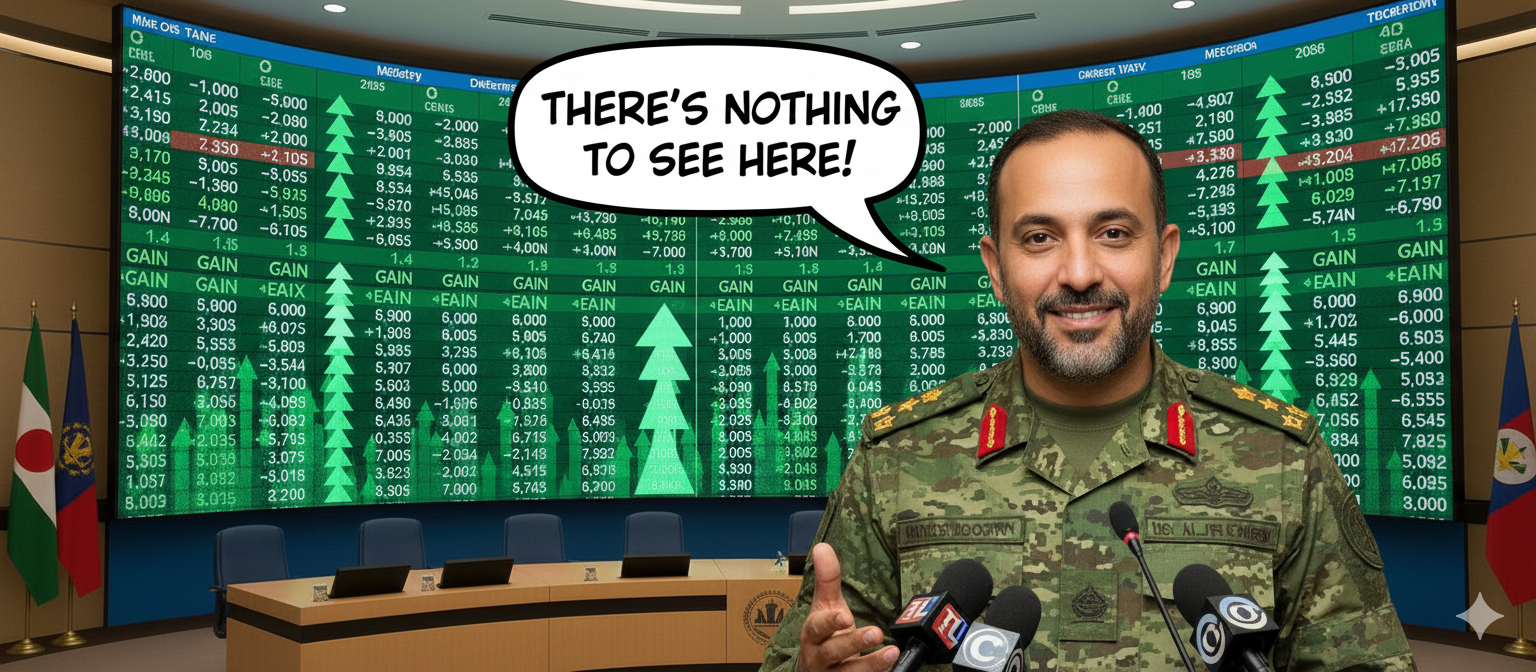
Everything Rally Returns as Markets Go “Comical Ali” On Us…
Posted October 21, 2025
By Sean Ring
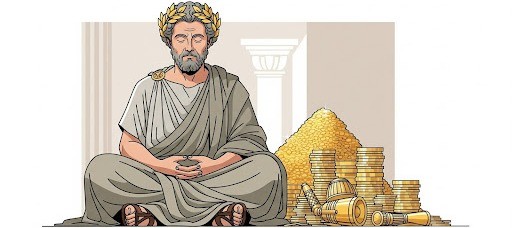
Red Screens, but a Clear Mind
Posted October 20, 2025
By Sean Ring

HODL Your GODL!
Posted October 17, 2025
By Sean Ring

I See Black Gold Risin’…
Posted October 16, 2025
By Sean Ring

Powell Pivots: QT Ends, QE Begins
Posted October 15, 2025
By Sean Ring

